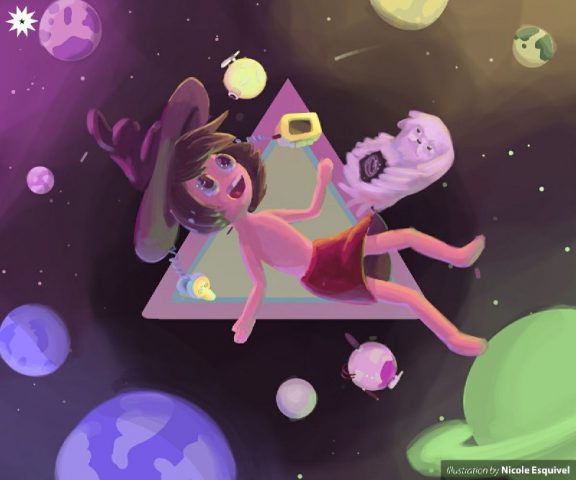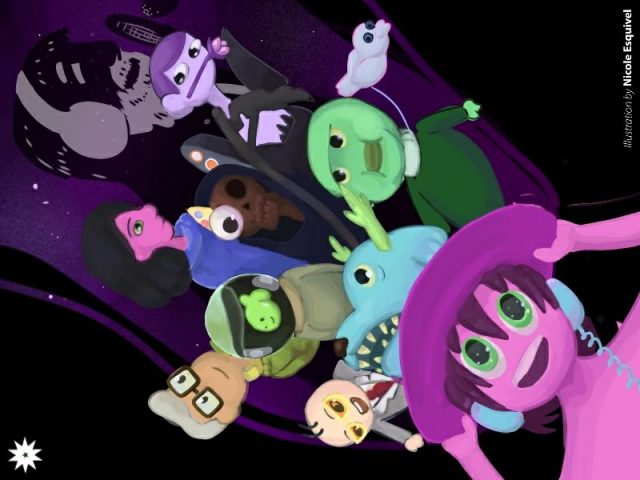Having arrived on Netflix on the unofficial “stoner” holiday, April 20 (4/20), The Midnight Gospel is an experimental adult cartoon crafted by Adventure Time’s creator Pendleton Ward, along with podcast host and psychonaut Duncan Trussell. With its bold format and transcendent content, The Midnight Gospel is a feast for the senses, offering a new creative possibility for cartoons and animation the likes of which we have never seen before.
Take audio snippets from a podcast tackling psychedelic-inspired topics, create surrealist animations to accompany the audio, and then toss in a bit more elements to smoothen up the plot transition, and what you get is a hybrid podcast-animation that has become visually and intimately more engaging to a wider audience.
The result is The Midnight Gospel’s mind-tripping kaleidoscope of colors that come to life on screen. Seemingly related symbolically, although sometimes just tangentially, the verbal concepts uttered in the dialogue tie in with the unconventional images that Ward and his animation team have concocted for the viewers.
A trippy dive into existentialism
At the start of each episode, the basic premise is that the main character, Clancy, enters through a new virtual reality through his “universe simulator”, in a kind of retro-inspired future where he uses seemingly 90s-influenced paraphernalia to interview denizens of these virtual planets for his “spacecast”. What then follows is a plethora of interesting conversations on topics like meditation, mindfulness, life, death, forgiveness, love, connection to the world—including eastern ideas of samsara or reincarnation and maya or illusion—and of course psychoactive substances.
Themes that other shows would generally shy away from are not just tackled in the dialogue, but also fantastically integrated in a thematic way through the world-building, such as the subject of escapism in today’s age of technology, and how virtual realities symbolically allow us to be birthed (represented by the shape of Clancy’s universe simulator) into different worlds as we so choose.
Given all this, it may not be everyone’s cup of tea. With its trippy visuals and discussions on controversial matters that may be considered by some as taboo, only those who approach the show with an open mind can enjoy the experience. The conversation-centric quality of the show, for the same reasons it can be praised, may also be a turn-off for some viewers; the plot moves very slowly, especially for the first few episodes which focus more on the self-contained dialogues between Clancy and his interviewees.
The series is also not the type of show to be binge-watched. All at once, there is a constant blast of auditory and visual information that due diligence is required to absorb the nuances infused all throughout the episodes. This, however, can also lend to it being highly rewatchable, for there are a lot of symbols and insights that the audience may have missed in their first viewing.

An invitation to inquire, introspect, and investigate
With such a premise for the show, the way Trusell, who is basically Clancy, acquiesces and agrees with every guest might seem the best course of action toward an open dialogue. Although in my opinion, the proper way to participate in a dialectic is to treat it like a two-way street, and I sometimes wished he challenged the ideas of his guests more often towards a healthy debate that can best encourage critical thinking.
But all in all, the interviews were insightful and had among them a colorful cast of individuals who discussed fascinating and novel ideas—such as occult and high magick, as well as a mish-mash of religious and spiritual beliefs. In this way, the show allows viewers to be introduced to these unfamiliar concepts and to venture into their own research and self-discovery.
As the podcast content offers varying points of view, it is able to tackle a wide range of interesting philosophical and psychological themes. Being on a large platform like Netflix allows for a wider conversational reach of these topics where we, the viewers, can identify for ourselves what we agree or disagree with. Additionally, such an open dialogue represents a continuing ideal toward the value of human expression, facilitating a free exchange of ideas that enables people to meaningfully learn from each other. This is valuable, as a medium that promotes uncensored dialogue means that we do not move toward a dystopian reality where our freedom of speech is controlled and suppressed.
No other real-life podcast has been incorporated into a show that has crafted visuals, characters, and a plot to make such information-heavy content much more entertaining and accessible to a wider audience. As such, The Midnight Gospel can be also a gateway to the longform podcast format that has lately been growing in popularity online. This creative undertaking might even usher in new types of formats—all toward more platforms for education and dialectic on diverse ideas and philosophies.

A revolutionizing contribution
Many also believe that the release of The Midnight Gospel, along with another Netflix documentary, Have a Good Trip: Adventures in Psychedelics, serves as a precursor to a new psychedelic renaissance in popular media. Especially on a platform as large as Netflix, this allows for a reintroduction of concepts that harkens back to 1960s psychedelia, which arose as a form of counterculture in response to political and social tensions in that decade. This time around, the renaissance as a whole was considered to have begun with scientists’ growing interest in the medical benefits of psychedelics on human mental and physical health.
Being a magnificent work of boundless creativity, perhaps the representation of The Midnight Gospel in new media can further liberate discussions on controversial and stigmatized topics, helping usher in an age of works which defy cultural norms, and herald a new counterculture in this increasingly rationalistic modern age.
Ultimately, despite the possible flaws of the show, such as its lack of plot in the beginning, a confusing barrage of information, or even its unique takes on certain topics, the last episode is one tearjerker that makes watching the entire series definitely worth it. The finale humanizes and encapsulates The Midnight Gospel, with the episode ending in the disintegration and destruction of a world, that then culminates with the eventual rebirth and resurrection, which is exactly the show’s take on death—that it’s not the end of it all.
Rating: 3.5/4
